Swiss frustrated over nuclear talks blockage
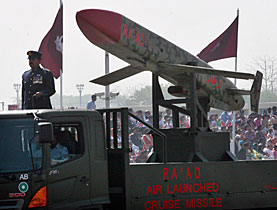
The latest stalemate in Geneva's nuclear disarmament talks is a "disappointing" setback, says the Swiss ambassador involved in the process.
In an interview with swissinfo.ch, Jürg Streuli, Switzerland’s representative at the Conference on Disarmament, said hopes had been high that serious negotiations could have begun this year to end the production of fissile material for bombs.
Arms negotiators failed to clear the way on Monday for the start of talks as Pakistan, which tested a nuclear weapon in 1998, said the implementing proposals could threaten its national security.
The conference, which is the world’s sole multinational forum for negotiating disarmament, broke a 12-year stalemate in May when it agreed a work plan to start negotiations on banning production of fissile material.
It also agreed to discuss three other issues – general nuclear disarmament, prevention of an arms race in outer space and “negative security assurances”, where countries promise not to use nuclear weapons on non-nuclear-weapon states.
But the next step, agreeing the implementation of the work plan so that different working groups could start examining the various issues, has proved impossible to achieve.
swissinfo.ch: What is your reaction to the new impasse over the Geneva nuclear arms talks?
Jürg Streuli: I understand Pakistan’s position that this is an important question for them and this treaty would mean a ban on the production of new fissile materials. But what is more difficult to understand is that we had consensus on the work programme and logically you agree to implement it.
So we are a bit disappointed and worried that after this breakthrough the conference might fall back into the lethargic state that characterised it during previous years.
swissinfo.ch: Doesn’t this latest stalemate mean the Conference on Disarmament now needs a major rethink?
J.S.: Yes and no. You can’t expect to have a major nuclear convention every five or ten years. We had the Nuclear Non-Proliferation Treaty (NPT) that has been in force for forty years and it works. We have the biological weapons convention and the chemical weapons convention, and both work.
The latest is the Comprehensive Nuclear Test-Ban Treaty (CTBT) and this hasn’t yet been ratified by every member. This is a slow process.
swissinfo.ch: What’s likely to happen now? How can you overcome Pakistan’s reservations?
J.S.: I didn’t expect too much this year. The big test will be when the conference resumes next January and then we’ll see if we can start with the work programme or negotiations.
If we then totally fail, we are in a bit of trouble. In the meantime, there will be the UN First Committee meeting [concerned with disarmament and related international security issues] in New York in October, a ministerial-level meeting of the General Assembly and a special session on disarmament at the Security Council.
There will be talks and interventions. Countries, ministers have to talk and continue a dialogue with Pakistan that is acceptable to everyone.
swissinfo.ch: In a speech in April President Barack Obama committed America to “seek the peace and security of the world without nuclear weapons”, singling out the Conference on Disarmament and the Comprehensive Test Ban Treaty as essential. How significant is this shift in policy?
J.S.: This speech changed a lot as it served as a basis for a breakthrough in the Conference on Disarmament.
[There have been other positive developments like] the US accepting multilateral ways of working, the start of bilateral negotiations with Russia and the fact that the US accepts verification in disarmament treaties.
There are also the talks with Russia on the follow-on pact for START-1 [the Strategic Arms Reduction Treaty], the breakthrough in the Conference on Disarmament, an announcement by the Obama administration to aggressively pursue the ratification of the CTBT and now the preparation of the 2010 NPT review conference, which will be a disarmament milestone. They are all pieces of a mosaic.
We are definitely optimistic. We had a preparatory meeting in New York in May and the whole atmosphere has changed.
When you look at the Obama speech, he talks about a vision of a nuclear-free world and says it might not happen in his lifetime. We have to work towards this.
swissinfo.ch: How active is Switzerland in the field of nuclear disarmament?
J.S.: We are active in different areas. I have been designated to chair future negotiations if the Conference of Disarmament re-implements the [work programme] mandate.
We are also co-sponsors of a resolution in the UN First Committee on lowering the operational status of nuclear weapons.
We also finance seminars and workshops; in general nuclear disarmament has become a new priority in the Swiss foreign ministry.
Simon Bradley in Geneva, swissinfo.ch
The main purpose of the CD is to negotiate arms control treaties. It is currently focusing on issues including: the cessation of the nuclear arms race and nuclear disarmament; prevention of an arms race in outer space; effective international arrangements to assure non-nuclear-weapon states against the use or threat of use of nuclear weapons; and new types of weapons of mass destruction.
The CD and its predecessors have negotiated such major multilateral arms limitation and disarmament agreements as the Treaty on the Non-Proliferation of Nuclear Weapons, conventions banning biological and chemical weapons, and the Comprehensive Nuclear Test Ban Treaty.
It is regarded as an autonomous body, although it has a close relationship with the United Nations.
The five permanent members of the UN Security Council are all nuclear powers: Russia, China, Britain, France and the US.
India, Pakistan and Israel also have nuclear arms.
North Korea has tested a warhead, and Iran is suspected of wanting to develop atomic weapons.

In compliance with the JTI standards
More: SWI swissinfo.ch certified by the Journalism Trust Initiative

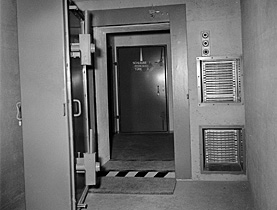
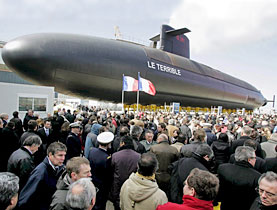
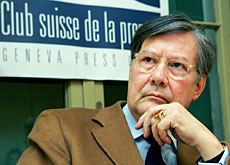
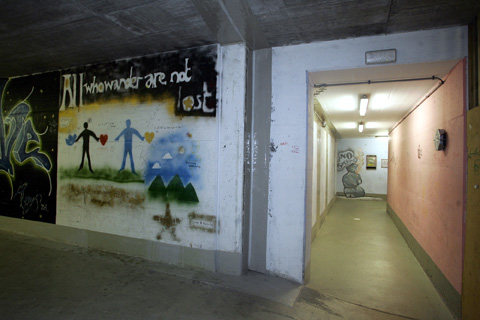
You can find an overview of ongoing debates with our journalists here. Please join us!
If you want to start a conversation about a topic raised in this article or want to report factual errors, email us at english@swissinfo.ch.